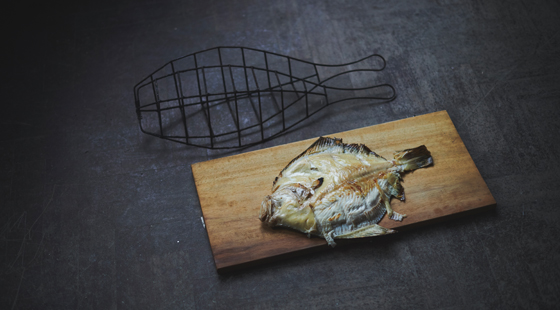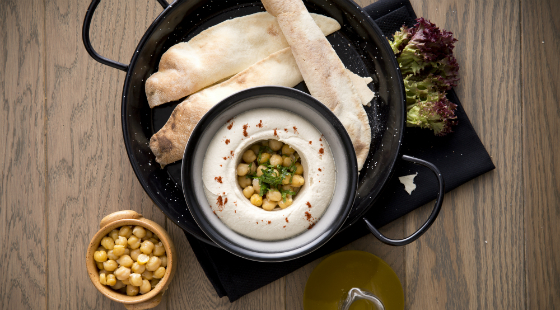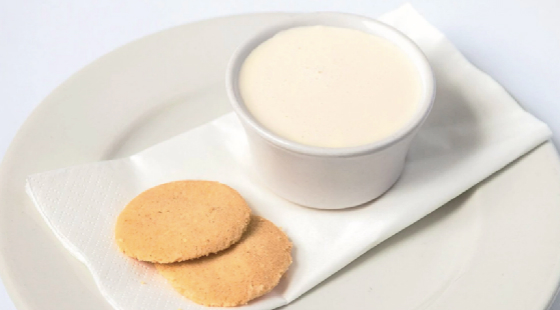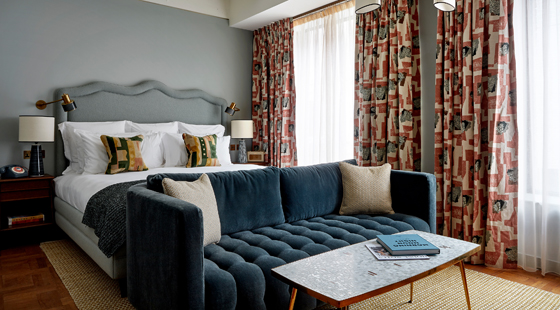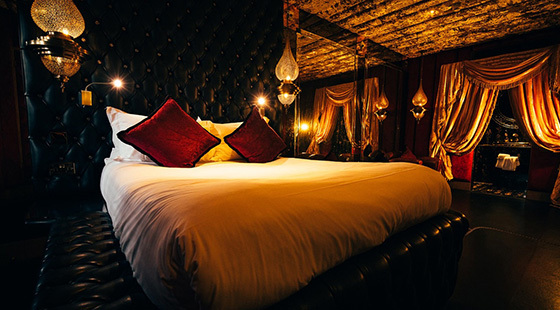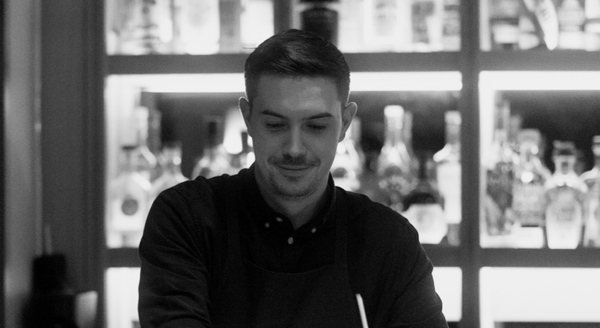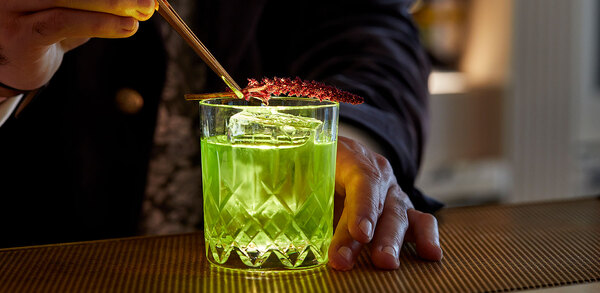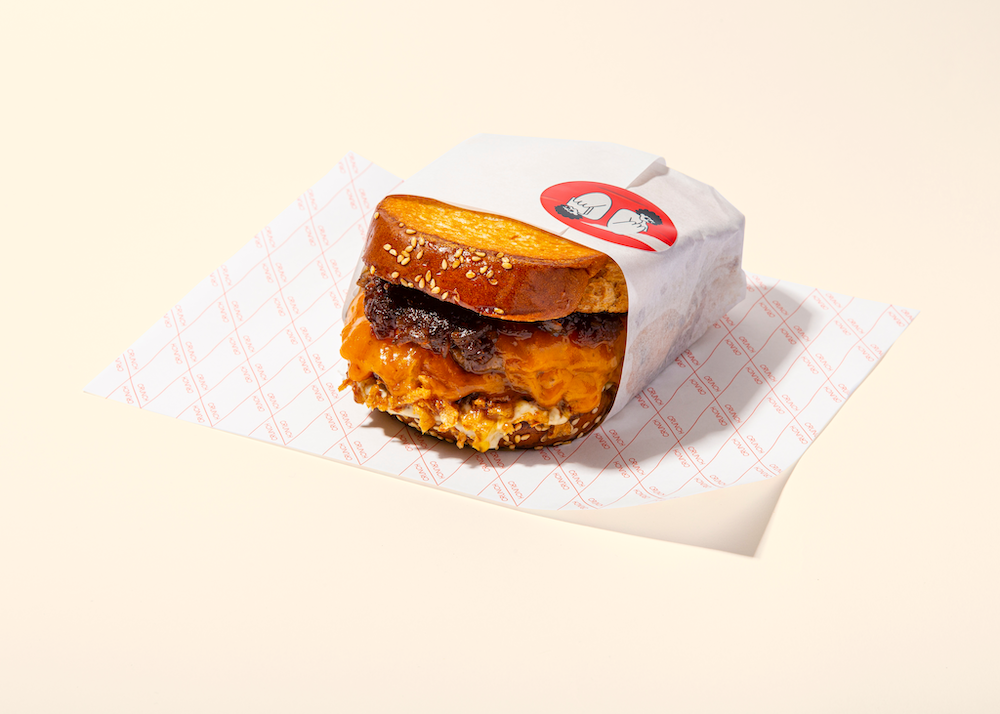Reviews: Hide is "a fabulous, barnstorming success"; Brat is "mind-blowing from the get-go"
Ollie Dabbous' Hide in London's Piccadilly is "a fabulous, barnstorming success", writes Frankie McCoy in the Evening Standard
Let's not beat about the bush. Hide is a five-star restaurant. It's the biggest new opening of 2018, thanks to its star chef (Ollie Dabbous) and big backer (Hedonism Wines) and it's surely the most expensive (costing more than £20 million, rumour has it). And it's a fabulous, barnstorming success.
We share one £16 supplement Cornish fish course, which is where things start getting very exciting. Squid ribbons slump in a saffron-pampered, olive oil-lavished, soul-enriching bouillabaisse that makes you rethink soup. As in, this is the only soup I want to eat, ever.
My boyfriend Dan's Norwegian king crab with chamomile is honeyed, salty and delicious but my turbot is better. This time there's nasturtium sauce, chlorophyll green, with the unexpected gluttonous fudginess of brown butter.
Desserts are pastel perfect: a Twister lolly of sorrel ice cream, a pale rose of coconut baked Alaska, jasmine-scented choux. A fairytale ending to a flawless meal.
Rating: 5/5
"Tomos Parry is putting as much of Wales as he possibly can into an offering that is otherwise broadly Basque and it is all just mind-blowing from the get-go," writes Giles Coren in The Times, reviewing Brat in London's Shoreditch
The wild rabbit, blood sausage and beans (£6.50) was a slice of morcilla and two of pressed, sweet bunny meat on a pile of coco beans (?), slick and warming and, like the oyster and the chopped egg, an object lesson in the power of the lukewarm. And the lesson was taught again in a dish of young leeks (as Welsh as the laverbread) covered with tearings of a soft warm cheese like a stracciatella, possibly homemade, and a scatter of golden breadcrumbs for crunch (£6.50).
The turbot (£55). The dish whose slang name, Brat, gives this restaurant its name. Cooked in the wood oven in one of Parryâs bespoke fish cages, it was done as perfectly as such a fish can be. Never have I seen the edges so crisp (making the bones edible) with the flesh so firm and yet the gelatinous parts so sweet and sticky on one animal. You simply cannot do a turbot this well at home, which is why I no longer bother. Nor can they in almost any restaurant, which is why they shouldnât either.
Cooking: 9; service 9; vibes 9; egg salad 10; score 9.25
It all goes downhill after the starters, writes The Sunday Times's Marina OâLoughlin reviewing Abd el Wahab in Londonâs Belgravia
The food that arrives at first is rather gorgeous: fluffy pillows of pitta, another chewier flatbread more like saj or chapati, vegetables of such crisp freshness they feel dew-flecked. A fibrous, oily baby aubergine is stuffed with chilli and nuts, radishes snap with peppery crispness. Basics are several notches above the norm: smoky moutabbal; hummus so silky, itâs clear the chickpeas have been laboriously peeled before blitzing. (The accomplished cook whoâs with me says this needs to be done while still hot for the full silkiness, pretty much defining painstaking.) Mhamara, that exquisite dip of roasted peppers and walnuts, has a brooding, darkly spiced quality â" all rubbly butchness. Tabbouleh sparkles with emerald parsley and pleasingly mouth-puckering quantities of sumac and lemon.
Then, hot stuff: little cigars of filo-wrapped, herbed cheese, fried till crisp; batata kezbra, chunks of fried potato jostling with masses of coriander and garlic. What a find, we congratulate ourselves. Whereupon, it all goes downhill as rapidly as a Brexit meme. Chicken livers in pomegranate molasses, overcooked into sinewy little operating-theatre offcuts; also violently overcooked is sea-bass siyadiyeh â" fine, headily spiced rice topped with a couple of dismal, leathery strips of fish.
Mixed grills are useful benchmarks in Lebanese restaurants: but again, everything (with the exception of chicken) is frazzled into a fistula. The lamb in the kofta tastes cheap and over-fatty, the manâoush bread on top has all the allure of tomato-smeared padded envelopes. The dish is as dejected as weâre beginning to feel.
Total: For three, including 12.5% service charge £211
The Guardianâs Grace Dent is won over by Club Mexicana at the Spread Eagle vegan pub in Londonâs Hackney
I say the Spread Eagleâs food is âMexican-influencedâ because culturally, and despite having a thriving vegan scene of its own, Oaxacan cuisine is not generally linked with breading and deep-frying âcheezeâ made from coconut oil. Or with jackfruit carnitas, either. Jackfruit, once roasted, shredded and mixed with liberal amounts of garlic, jalapeño, cumin and oregano, looks and tastes alarmingly like pulled pig flesh. At the Spread Eagle, itâs served with a vibrant red pico de gallo salsa and a strong, citrus-garlic hit of mojo de ajo garlic sauce. Likewise, do Mexicans eat fish-finger sandwiches with a vegan tartare? And, if so, where do they stand on the Spread Eagleâs âtofishâ â" an oddly realistic, breadcrumbed âcodâ finger with a wafer-thin layer of inky nori underneath its crumb coating to replicate fish skin?
I love the mental gymnastics of modern vegan food, which seeks to give the vegan uptaker the things they did not imagine theyâd miss: bleeding âmeatsâ, fake bones in âchicken wingsâ, and fatty lumps in fake chorizo. Eating is much more complex than merely taste and appetite. It is about memories, a sense of belonging and of finding comfort in the recognisable, so at the Spread Eagle there is âsour creamâ to go with the triple-fried potatoes and the popcorn chickân salad comes with âmayoâ.
Food: 8/10; atmosphere: 8/10; service: 8/10. About £20 a head, plus drinks and service
The Observerâs Jay Rayner checks out Gaijin Sushi in Birmingham
Hot steamy bowls of fragrant miso soup â" is that sesame oil I smell or something else? â" come with pieces of salmon bobbing in their depths. There are two tempura options, salmon and prawn, though as both are panko breadcrumbed rather than battered and lacy, Iâm not sure they quite qualify as tempura. But as with the arguments on authenticity, Iâm really not that inclined to give a toss. They can call them new wave tempura, or Japanese fritters or Keith for all I care. Letâs just describe them as very fine deep-fried things. Discs of salmon are soft beneath their crisp overcoat as if they have steamed in just seconds (the steaming of breadcrumbed foods being the whole point of most deep frying). These are also both extremely good value. Just £8 brings you six big prawns, each longer than my middle finger and trust me, I have big hands. Itâs a steal.
The same applies to the nigiri sushi, which are about £4 for two pieces. Slices of sticky, grilled eel are blowtorched until the oils are just starting to run, then dribbled with a little more teriyaki sauce. There are sweet, glossy translucent prawns, and surf clams, running from a deep crimson to white, like the petals of a variegated rose. There is the deep purple of tuna, and salmon with the lines of fat ribboning it in white. (A perfect example of the pointless debate over authenticity. Up until the 1970s, Japan imported very little fish, which meant salmon was not a part of the sushi repertoire. It took an enterprising Norwegian trade delegation, looking for new markets, to change that.)
Meal for two, including drinks and service: £60
The Telegraphâs Michael Deacon reviews The Hundred of Ashendon in Buckinghamshire
I started with the potted duck: cool, thick and rich, served with two slices of toast and complemented by strips of pickled red cabbage, sweet and tangy. My brother-in-lawâs garlic soup didnât taste tremendously garlicky, but my father-in-lawâs salt cod was great, ringingly fresh.
My main was feather blade beef, with braised chicory and pickled walnut. The feather blade is a cut from the cowâs shoulder, and mine â" a squat little block of it â" was beautifully, meltingly soft, falling apart at the merest glance from my fork. Blushing, swooning, helplessly overcome. I also liked my sister-in-lawâs witch sole, slim and crispy, with roast cauliflower and sea purslane (a leaf with a salty, nutty quality).
I loved my pudding: lemon posset, with an extra layer of cream on top. Pure swirling dreaminess, as clean and bright as spring air. My wife had the rhubarb Eton mess. A bit smaller, neater and, well, less messy than most, but still good. Itâs a childâs pudding, really, but I donât mean that in a bad way: thereâs just something about Eton mess that is innocent, and greedy, and silly, like all the classic puddings of childhood, a gleeful carefree overload of sweetness, maximum sugar and maximum cream.
HOTELS
Tom Chesshyre of The Times says the room rates are enticing at White City House, newly opened in BBC Televisionâs former home in West London
The 45 rooms are compact and well thought-out, with parquet floors and retro cocktail cabinets. Expect wide, low-slung sofas, Bakelite phones, dressing-table mirrors with lights, and pistachio-coloured walls. Minibars are stocked with spirits and little chopping boards with limes. Bathrooms have hexagonal tiles and supplies of Cowshed products. The cheapest rooms are from £120 room-only. As a guest you have access to the private membersâ club, with its bars, spa, juice bar and huge gym.
The food in the main restaurant has an Asian twist, although comfort food such as Scotch eggs, pizzas and cheeseburgers are also available. The restaurant is in a new-build annexe connected to the BBC building, on the ninth floor, next to a bar with pearl-grey stools and slatted oak walls. My bao bun with barbecued pork and pineapple jam was a tasty little starter, followed by chicken with coconut sambal and green mango (the chicken pleasantly spicy). The ginger sorbet with carrot cake was sharp and refreshing (the mealâs highlight). Three courses cost from about £25.
Double rooms cost from £120
Writing in the Sunday Telegraph, Hattie Garlick says she crossed over into her âown personal hellâ during her stay at the Shoreline hotel at Butlinâs in Bognor Regis, West Sussex, while her children had the best time of their lives
Pick and choose selectively and a trip to Butlins, we begin to see, could be something of a jolly exercise in time-travel. Back to a simpler time of seaside japes, never-ending ice creams, limitless fairground rides (itâs all included, after all) and a constant schedule of cheap and cheerful fun.
The Shoreline is decked out like a giant cruise ship, âIt is all so shippy!â screamed the seven-year-old. âLook at this shippy wardrobe! Even the bed is shippy!â
The room covered all the essentials; hairdryer, mini-fridge, TVs for both kids and adults; but he had, inadvertently, hit upon something. Snug double bed? Bit shippy. Bath gowns the texture of pirateâs stubble? Bit shippy. Faintly funky smell in the corridor? Bit shippy.
Nor does all this come cheap. During school holidays, three nights cost a family of four £840, without breakfast.
That does, however, cover the resortâs myriad childrenâs activities, facilities and performances. Because this place is designed for kids, not pretentious parents. And to that extent it had nailed its brief.
Rating: 7/10. Price: A three-day midweek break costs £460 for a family of four, rising to £840 during school holidays.



